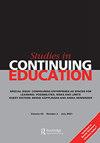工程实习学生的学习成果:一个临时框架
IF 1.9
4区 教育学
Q2 EDUCATION & EDUCATIONAL RESEARCH
引用次数: 7
摘要
摘要人们普遍认为,实习为工科学生提供了发展多样化知识和能力的绝佳机会。然而,与在课堂上学习相比,在工作场所学习的可预测性较差。这项研究旨在解决研究问题“工科学生从实习经历中感知到的学习成果是什么?”通过使用定性方法来找出学生感知学习结果的共性和差异。采用内容分析法和常量比较分析法,对香港10名工科学生的访谈数据进行分析。揭示了四类学习成果:知识、与学术相关的通用能力、非技术通用能力和技术能力。我们的研究结果与文献相反,文献表明,大多数工程实习生感知到技术能力(如信息技术(I.T.)技能)和非技术通用能力(如团队合作技能和积极态度)的发展。随后,一个临时框架说明了工科学生对实习学习结果的感知存在差异。这些发现有助于为实习课程设计中的建设性调整铺平道路,从而确定学生感知的学习结果将有助于设定现实而明确的预期学习结果。本文章由计算机程序翻译,如有差异,请以英文原文为准。
Students’ learning outcomes from engineering internship: a provisional framework
ABSTRACT There is widespread consensus that internships provide great opportunities for engineering students to develop diverse knowledge and competencies. Yet, compared to learning in the classroom, learning in the workplace is less predictable. This study aims to address the research question ‘What are engineering students’ perceived learning outcomes from their internship experience?’ by using a qualitative approach to pinpoint commonalities and differences in students’ perceived learning outcomes. Content analysis and constant comparative analysis were used to analyse interview data collected from ten engineering students in Hong Kong. Four categories of learning outcomes were revealed: knowledge, academic-related generic competencies, non-technical generic competencies and technical competencies. Our findings are contrary to the literature indicating that most engineering interns perceived the development of technical competencies (e.g. information technology (I.T.) skills) and non-technical generic competencies (e.g. teamwork skills and positive attitudes). Diversity in engineering students’ perceived learning outcomes of internship was subsequently illustrated by a provisional framework. The findings help pave the way for constructive alignment in internship course design such that identification of students’ perceived learning outcomes will facilitate the setting of realistic and clear intended learning outcomes.
求助全文
通过发布文献求助,成功后即可免费获取论文全文。
去求助
来源期刊

Studies in Continuing Education
EDUCATION & EDUCATIONAL RESEARCH-
CiteScore
4.70
自引率
6.70%
发文量
22
期刊介绍:
Studies in Continuing Education is a scholarly journal concerned with all aspects of continuing, professional and lifelong learning. It aims to be of special interest to those involved in: •continuing professional education •adults learning •staff development •training and development •human resource development
 求助内容:
求助内容: 应助结果提醒方式:
应助结果提醒方式:


